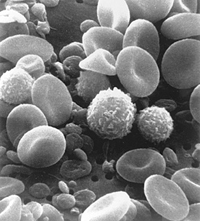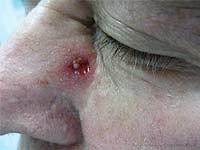Treatment of chemotherapy - this is in itself a difficult test for a person, but it turns out that this treatment has its own complications. One of them - neutropenia. What is this disease and what it is dangerous during chemotherapy - read the article.
Content
Reducing the number of neutrophils (granulocytes) is called neutropenia. Very deep decline (<500 neutrophils in blood microlitre) call agranulocytosis.
Neutrophils play a very important role in the fight against infections. With a decrease in the level of neutrophils, there is a risk of infections, including serious, requiring urgent hospitalization and the appointment of massive antibiotic therapy.
The hematopoietic fabric consists of immature cells (stem-forming hematopoietic cells and precursor cells) capable of differentiation in the most different types of blood cells. The most common complications of chemotherapy associated with its negative impact on the hematopoietic fabric are anemia (reducing the number of red blood cells - erythrocytes responsible for the transfer of oxygen), thrombocytopenia (decrease in the number of platelets responsible for chopping blood) and neutropenia (reducing the number of neutrophils). The most frequent and dangerous complications of chemotherapy are related to neutropenia.
 Depending on the number of neutrophils in peripheral blood, 4 degrees of neutropenia are distinguished, the most easily of which is the first, and the most severe - the fourth. Avoiding the development of neutropenia during modern treatment schemes is almost impossible. As a rule, with an increase in the dose of injected chemotherapy, both the effectiveness of treatment and the severity of neutropenia and its duration.
Depending on the number of neutrophils in peripheral blood, 4 degrees of neutropenia are distinguished, the most easily of which is the first, and the most severe - the fourth. Avoiding the development of neutropenia during modern treatment schemes is almost impossible. As a rule, with an increase in the dose of injected chemotherapy, both the effectiveness of treatment and the severity of neutropenia and its duration.
Neutrophils are one of the main factors for the protection of the body from infection. In case of insufficient number, the microbes falling into the body freely multiply. Therefore, neutropenia is the main cause of the development of infectious complications after chemotherapy. Another negative consequence of neutropenia is the need to extend the intervals between chemotherapy courses in order to give the body to restore the number of neutrophils. At this time, you need to monitor the level of neutrophils - to take blood tests 1 or 2 times (if the course is carried out outpatient; in the hospital, usually, more often). The patient should know that he has neutropenia or agranocytosis and comply with precautions during this period. Infections during neutropenia can develop very quickly and everything depends on the speed of assistance.
What kind of symptoms it is necessary to inform the doctor, if possible, faster:
- Increase temperature of more than 38 degrees.
- Chills.
- Pain in the throat.
- Rash.
- Diarrhea.
- Edema, pain, redness of the skin around wounds, in the field of genital, buttocks.
With the normal content of neutrophils in the blood (from 4 to 7 million cells per ml of blood), a person is reliably protected from infections caused by pathogenic bacteria and fungi. In cases where the number of neutrophils falls below 500 thousand per ml (IV degree of neutropenia), the risk of developing infectious complications is very high. However, it is very important that the increase in leukocytes does not turn into an end in itself. The level of leukocytes in itself is dangerous, but a tendency to infections that occurs. It should be asked the maximum forces to prevent infections and continue treatment.
Such patients need to appoint expensive antibiotics and antifungal drugs, which, however, may not always prevent the development of infection. An alternative method for the prevention of infectious complications of chemotherapy is the treatment of neutrophenia itself. To this end, a granulocytic colony positive factor (Mr.) is used - protein, stimulating the formation of neutrophils from precursor cells.









